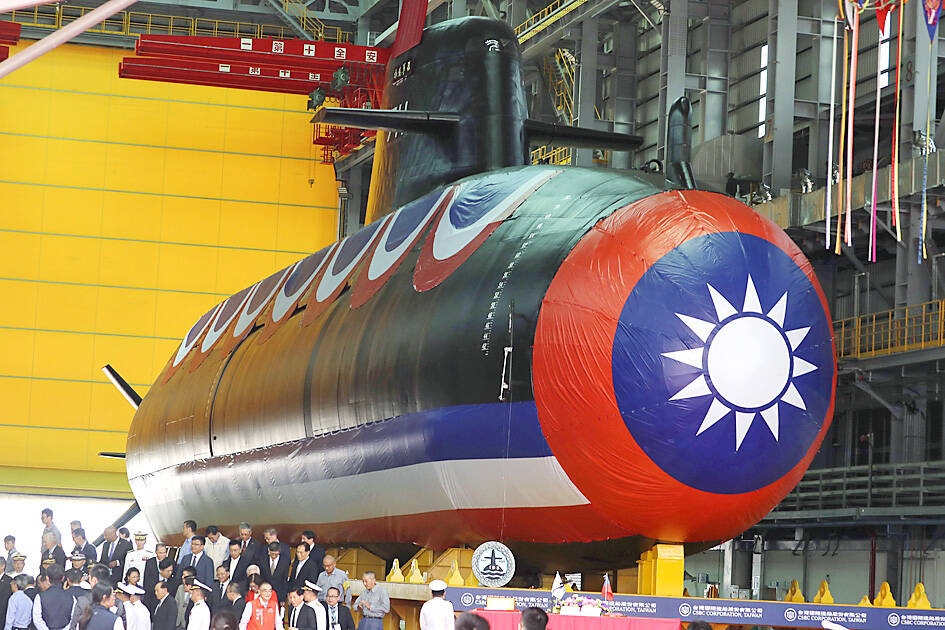The combat capabilities of Taiwan’s domestically built Hai Kun (海鯤號), or “Narwhal,” submarine are slightly superior to Japan’s submarines, a retired Japanese military officer said.
Kazuki Yano, a former submarine fleet commander in the Japan Maritime Self-Defense Force, made the comment in a TV program produced by BS Nippon Corp and aired earlier this month.
Rira Momma, a professor of security studies at Takushoku University’s Institute of World Studies, was also invited to join the program.

Photo: Chiang Ying-ying, AP
Seven countries are involved in the construction of the Hai Kun, including members of the AUKUS alliance, Yano said, describing it as the result of cooperation among the US’ allies.
Despite pressure from China, these allies have shown a strong will to help Taiwan build its own submarine, which is “of great military significance,” he said.
Regarding rumors that a legislator passed classified material about the submarine program to South Korea, Momma said that information leakage would be Taiwan’s weakness.
Intelligence related to the Hai Kun being leaked to an enemy would be “fatal,” as it might put an end to assistance Taiwan was getting from other countries such as the US and Australia, he said.
However, Yano said that countries providing relevant technologies to Taiwan were aware, to a certain extent, that the technologies and intelligence would be leaked to China sooner or later.
He thought that the Hai Kun is “slightly better than Japan’s submarines” but could have been “very good,” he said.
The Hai Kun is equipped with a combat system developed by Lockheed Martin Corp, which might be a simplified version used by US nuclear submarines, and a sophisticated sonar system that can detect objects in all directions, he said.
The US might have provided Taiwan with lower-performance technologies instead of the latest ones out of concerns that they might be leaked, Yano said.
Building a submarine is hugely meaningful, as it shows Taiwan’s firm self-defense determination, he said, adding that the advantages that submarines offer could negate Beijing’s “anti-access/area denial” strategy and make it hesitant about launching a war against Taiwan, he said.
Completing one submarine can already enhance deterrence, as China would have to put in more effort to guard against its sneak attacks, he said.
The Hai Kun would become Taiwan’s “ace” and “secret weapon,” as it would take time and effort to detect it, Momma said.
The Democratic Progressive Party government announced the completion of the Hai Kun ahead of the presidential election on Jan. 13 next year to underline its determination to safeguard Taiwan, he said.
The involvement of the US, Australia, and possibly Japan and South Korea, in the submarine construction could further reassure Taiwanese voters, Momma said.
The cost of the Hai Kun, at approximately NT$230 billion (US$7.14 billion), is unprecedented for a conventional submarine, which might provide clues to its possible equipment, Yano said.
The cost of building a Japanese submarine is about NT$75 billion.

Global bodies should stop excluding Taiwan for political reasons, President William Lai (賴清德) told Pope Francis in a letter, adding that he agrees war has no winners. The Vatican is one of only 12 countries to retain formal diplomatic ties with Taiwan, and Taipei has watched with concern efforts by Beijing and the Holy See to improve ties. In October, the Vatican and China extended an accord on the appointment of Catholic bishops in China for four years, pointing to a new level of trust between the two parties. Lai, writing to the pope in response to the pontiff’s message on Jan. 1’s

A Vietnamese migrant worker on Thursday won the NT$12 million (US$383,590) jackpot on a scratch-off lottery ticket she bought from a lottery shop in Changhua County’s Puyan Township (埔鹽), Taiwan Lottery Co said yesterday. The lottery winner, who is in her 30s and married, said she would continue to work in Taiwan and send her winnings to her family in Vietnam to improve their life. More Taiwanese and migrant workers have flocked to the lottery shop on Sec 2 of Jhangshuei Road (彰水路) to share in the luck. The shop owner, surnamed Chen (陳), said that his shop has been open for just

HOLIDAY EXERCISE: National forest recreation areas from north to south offer travelers a wide choice of sights to connect with nature and enjoy its benefits Hiking is a good way to improve one’s health, the Forestry and Nature Conservation Agency said, as it released a list of national forest recreation areas that travelers can visit during the Lunar New Year holiday. Taking a green shower of phytoncides in the woods could boost one’s immunity system and metabolism, agency Director-General Lin Hwa-ching (林華慶) cited a Japanese study as saying. For people visiting northern Taiwan, Lin recommended the Dongyanshan National Forest Recreation Area in Taoyuan’s Fusing District (復興). Once an important plantation in the north, Dongyanshan (東眼山) has a number of historic monuments, he said. The area is broadly covered by

TAKE BREAKS: A woman developed cystitis by refusing to get up to use the bathroom while playing mahjong for fear of disturbing her winning streak, a doctor said People should stand up and move around often while traveling or playing mahjong during the Lunar New Year holiday, as prolonged sitting can lead to cystitis or hemorrhoids, doctors said. Yuan’s General Hospital urologist Lee Tsung-hsi (李宗熹) said that he treated a 63-year-old woman surnamed Chao (趙) who had been sitting motionless and holding off going to the bathroom, increasing her risk of bladder infection. Chao would drink beverages and not urinate for several hours while playing mahjong with friends and family, especially when she was on a winning streak, afraid that using the bathroom would ruin her luck, he said. She had